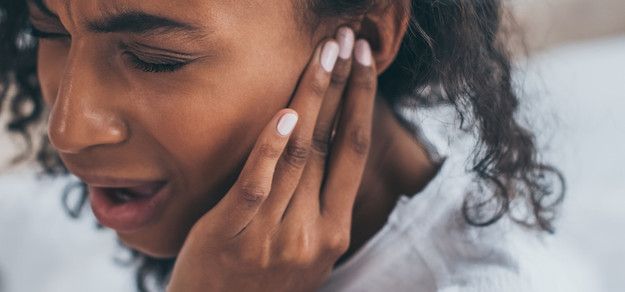TMJ Ear Pain
7th Feb 2021

If you're connecting the dots, the temporomandibular joints connect the jawbone to either side of the skull just below the ears. That makes temporomandibular joint disorder a natural suspect if you find yourself battling ear pain. It is a likely culprit, but it isn't the only one. Understanding more about TMJ ear pain, what causes it, how to identify it, and how to treat it can help you find some welcome relief.

Causes of Temporomandibular Joint Disorder
Temporomandibular joint disorder is quite a mouthful. Doctors and patients alike often prefer to use friendlier terms like TMD or TMJ disorder when discussing this painful condition. What happens when TMJ disorder strikes? Basically, a dysfunction causes pain in the jaw joint and jaw muscles. However, the discomfort doesn't always stop there. Like ripples in a pond, its effects can spread to impact other nearby areas, like the ears, too.
Determining a specific cause for a TMJ disorder can be difficult. In many cases, a combination of factors is involved. Genetics, injury, and arthritis are common suspects. A malocclusion, or an issue with your bite, can leave you more vulnerable to muscle spasms and set the stage for TMJ pain. Overuse of the jaw can be another issue. That means something as simple as chewing gum can be problematic for people with TMD.
With its habitual teeth grinding and jaw clenching, bruxism is another frequent suspect in TMJ disorders. Stress and psychological triggers can contribute to muscle tension and aggravate bruxism. They can also worsen TMJ disorders and the resulting TMJ pain.
Related Articles:
Why TMJ Causes Ear Pain
The jaw joints and the muscles that surround it are all fairly close to the ear. It should come as no surprise that when they're distressed, the ear can be impacted. In fact, one study found that nearly 80% of TMJ patients experienced some type of ear symptom.
When a TMJ disorder causes subtle muscle spasms or pain, that discomfort often radiates out from the jaw to affect other nearby structures, and the ear is certainly nearby. As a result, if you're unlucky enough to suffer from a TMJ disorder, you may find yourself dealing with pain and tenderness in your ear. However, it's important to remember that a TMJ disorder isn't the only potential cause of ear pain.
Is It TMJ Ear Pain or an Ear Infection?
How can you tell if TMJ ear pain? When should you be worried that it might be something else?
As Mayo Clinic explains, an ear infection occurs when the middle ear, the air-filled space behind the eardrum, becomes infected. This often happens when a virus, illness, or bacterium causes congestion and swelling in the sinuses and nasal passages, including the eustachian tubes, which connect the middle ear to the back of the throat. With the eustachian tubes blocked, fluid can build up in the middle ear. This can allow an infection to develop.
TMJ ear pain can produce tenderness, ringing, diminished hearing, hearing loss, and sensations of fullness in the ear canal. Unfortunately, an ear infection tends to produce those same symptoms.
Circumstances will often help you tell the difference. If your ear pain is worse after a flare of intense jaw activity, you have other symptoms of a TMJ disorder, and your doctor sees no indications of an ear infection, then you are likely dealing with TMJ ear pain.
In contrast, if you have a fever, are recovering from a recent illness, or have any discharge coming from your ear, then you are probably dealing with an ear infection. Most ear infections will resolve on their own with time, so treatment tends to involve pain medications for the patient's comfort. In some cases, antibiotics may be prescribed.

Treating TMJ Ear Pain
Neither time nor antibiotics will help resolve the ear pain caused by a TMJ disorder. Fortunately, there are effective treatments that can target the problem at its source and soothe the uncomfortable symptoms. There are a variety of treatment options that can be used either alone or in combination to treat TMJ pain:
Night guards to treat TMJ Ear Pain:
Whether you choose to call it an occlusal appliance, TMJ splint, night guard, or mouthguard, the idea is the same. Wearing an oral appliance that fits over your teeth and sits between the upper and lower teeth can reduce teeth grinding and jaw clenching. This decreases the strain on the jaw joints and muscles. Although you may see an over-the-countermouthguard for TMD advertised, be wary. Most bruxism sufferers can take advantage of great options for affordable, custom-fitted, professional-quality night guards like those offered by Pro Teeth Guard without any hesitation. After all, our top-rated products are virtually the same as the ones that you'd get from your dentist. However, getting the right fit is especially crucial for TMJ patients. Here, it's probably best to deal with your dentist's office for a custom mouth guard.

- Most Popular
- Hard Outside, Soft Inside
- 2MM Thick
- Moderate / Heavy

- Most Durable
- Hard Materials
- 1.5MM Thick
- Heavy / Severe

- For Day Time Use
- Thin, Barely Visible
- 1MM Thick
- Light / Moderate

- For Clenching
- Flexible & Soft
- 1.5MM Thick
- Light / Moderate
Medications for Ear Pain from TMJ:
Muscle relaxants, antidepressants, anti-inflammatory drugs, and pain relievers are sometimes prescribed to reduce the discomfort associated with TMJ disorders.
Injections:
Botox and corticosteroid injections may be used to relax the muscles and reduce joint inflammation.
Physical therapy for TMJ Pain:
Exercises to strengthen the jaw muscles and applications of heat or ice may be helpful.
Lifestyle changes:
Small lifestyle changes can make a big difference. For example, choose soft foods, and cut food into small pieces. Avoid chewy or sticky foods, and break habits like chewing gum or biting your fingernails. If you suffer from bruxism, seek treatment.
Other Symptom of TMJ Disorders
TMJ ear pain is a frequent symptom. However, there are other signs that may indicate that you have a TMJ disorder. These include pain in your face, jaw, neck, or shoulders. Headaches or migraines can also be red flags. Ringing in your ears, or tinnitus, is another. If you hear or feel clicking or popping from the jaw joint, it could be a TMJ disorder. Does your jaw sometimes feel like it locks, making it difficult to open or close? Again, that could be a sign of a TMJ disorder.
Related Articles:
If you suspect that a TMJ disorder is to blame for your earache, schedule a dental appointment. Your dentist will probably want to discuss your symptoms and conduct a physical exam. Be ready to answer questions about when your problems started and your medical history.

- Most Popular
- Hard Outside, Soft Inside
- 2MM Thick
- Moderate / Heavy

- Most Durable
- Hard Materials
- 1.5MM Thick
- Heavy / Severe

- For Day Time Use
- Thin, Barely Visible
- 1MM Thick
- Light / Moderate

- For Clenching
- Flexible & Soft
- 1.5MM Thick
- Light / Moderate
